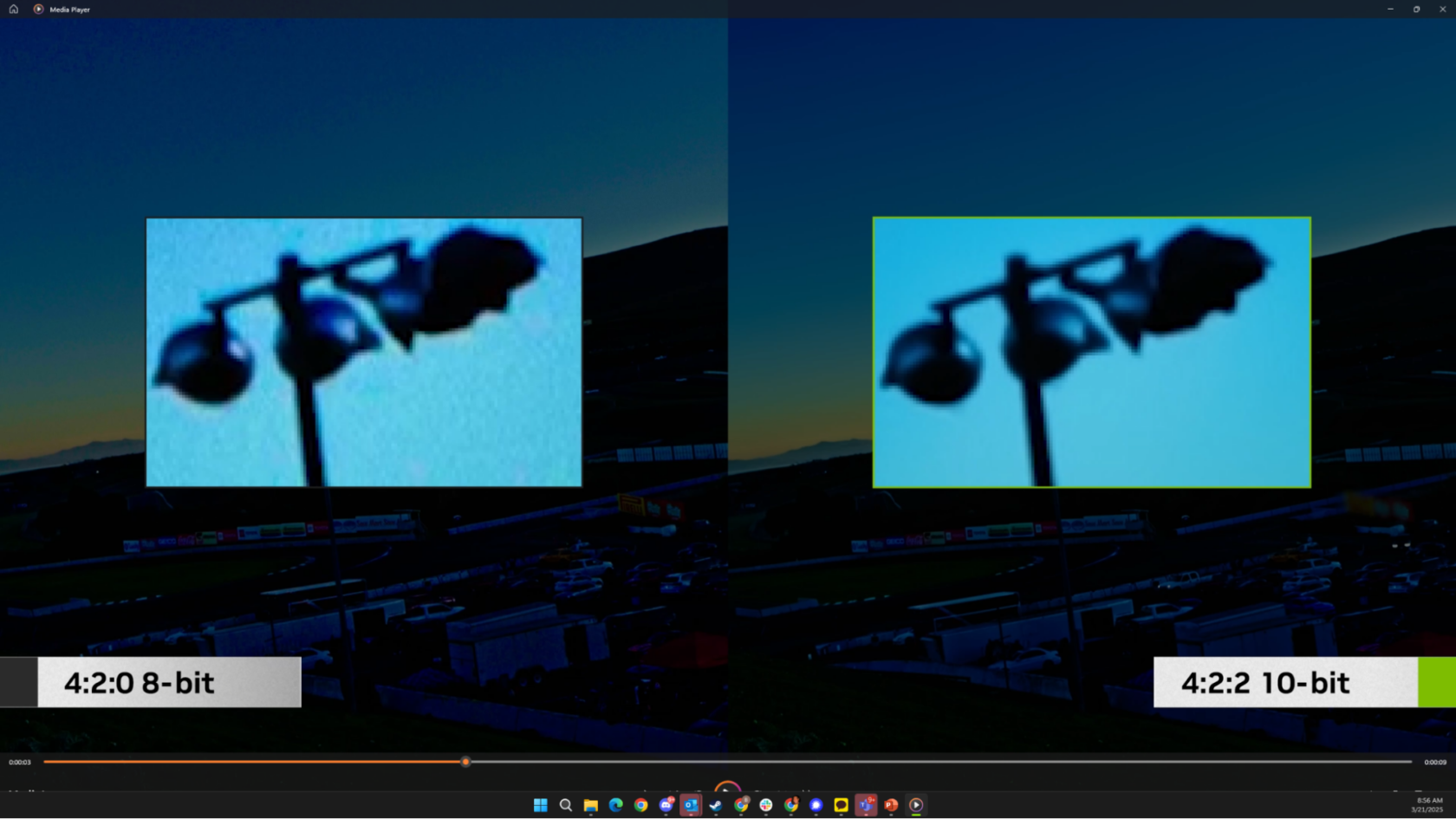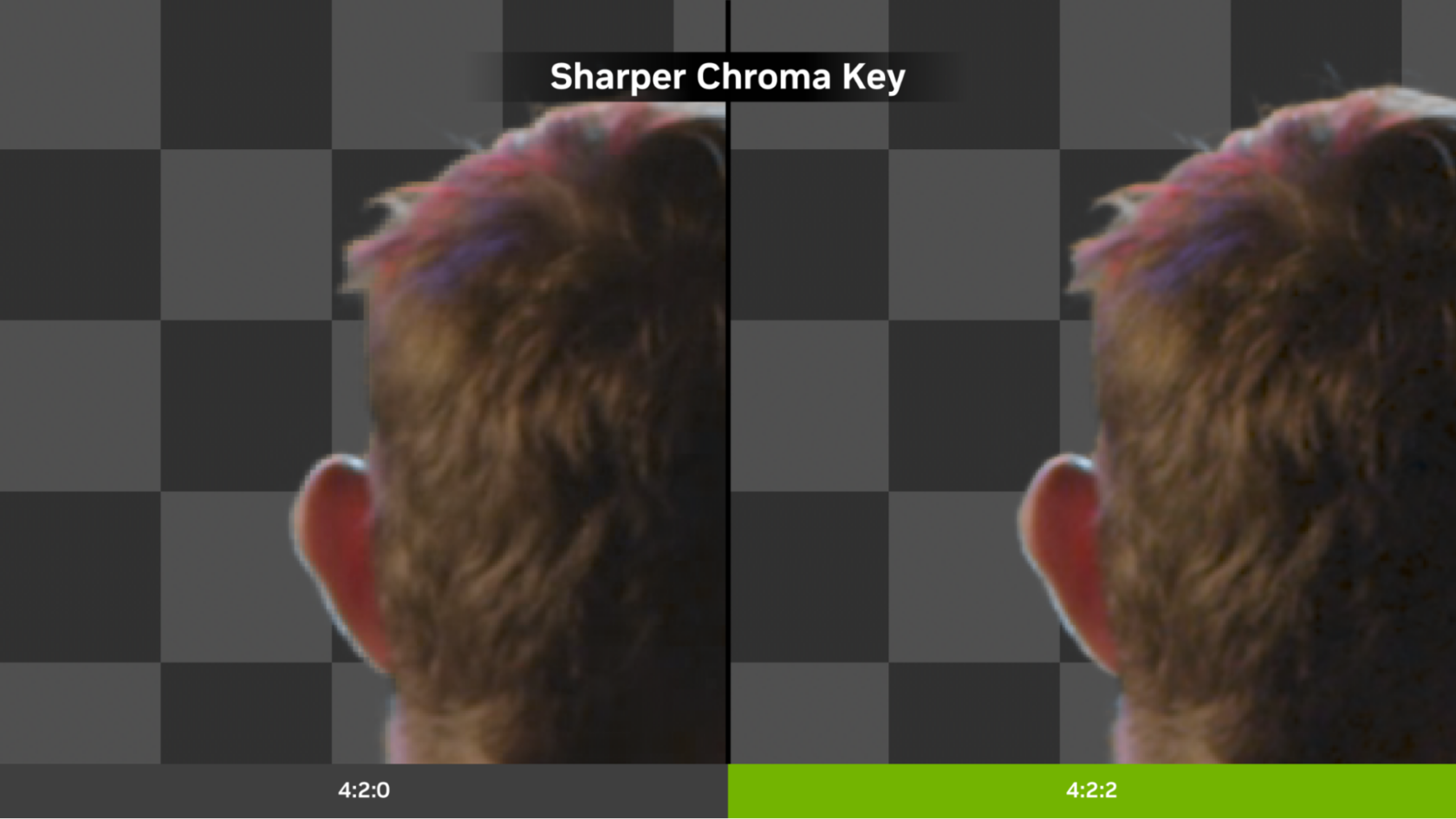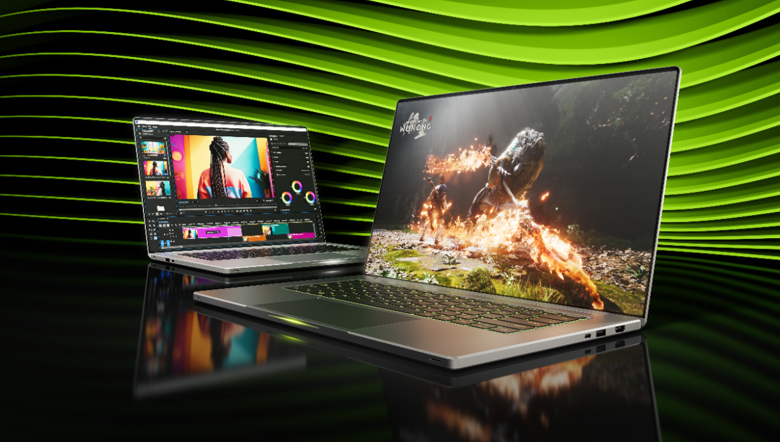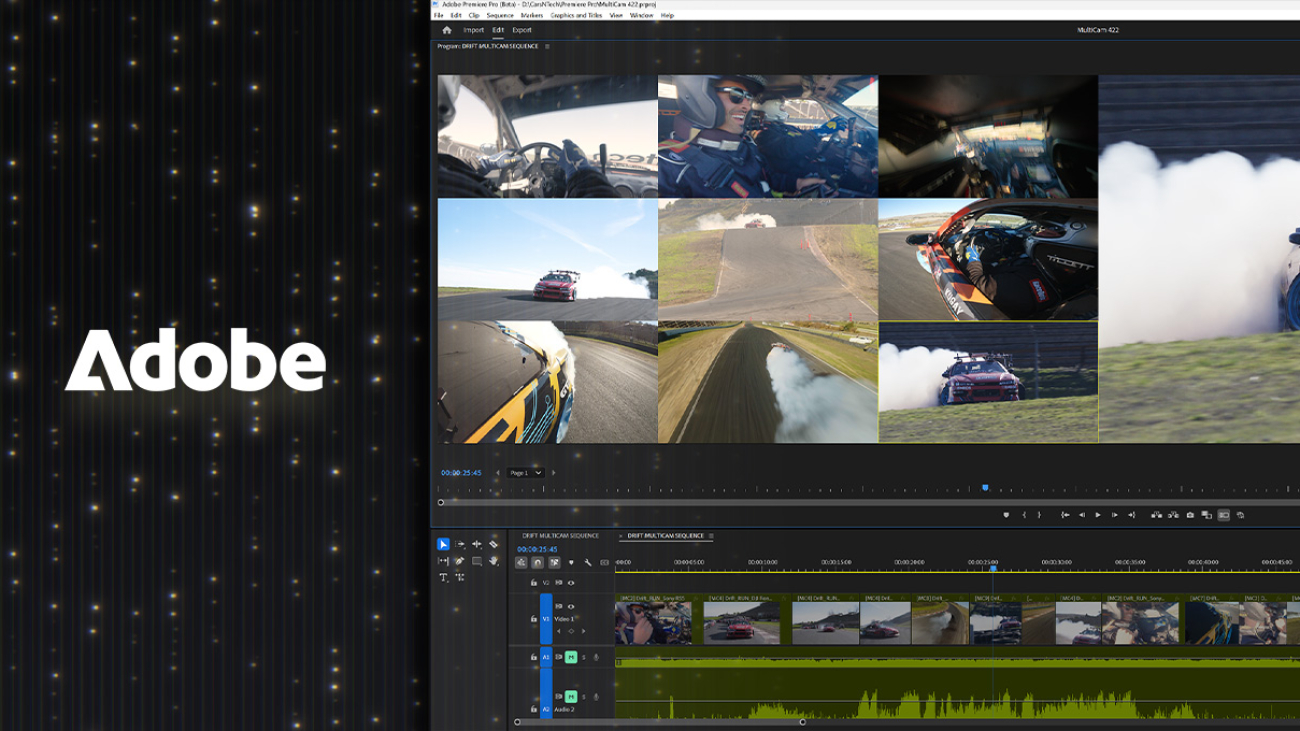Our framework enables cybersecurity experts to identify which defenses are necessary—and how to prioritize themRead More
Evaluating potential cybersecurity threats of advanced AI
Our framework enables cybersecurity experts to identify which defenses are necessary—and how to prioritize themRead More
Evaluating potential cybersecurity threats of advanced AI
Our framework enables cybersecurity experts to identify which defenses are necessary—and how to prioritize themRead More
Evaluating potential cybersecurity threats of advanced AI
Our framework enables cybersecurity experts to identify which defenses are necessary—and how to prioritize themRead More
NVIDIA GeForce RTX 50 Series Accelerates Adobe Premiere Pro and Media Encoder’s 4:2:2 Color Sampling
Video editing workflows are getting a lot more colorful.
Adobe recently announced massive updates to Adobe Premiere Pro (beta) and Adobe Media Encoder, including PC support for 4:2:2 video color editing.
The 4:2:2 color format is a game changer for professional video editors, as it retains nearly as much color information as 4:4:4 while greatly reducing file size. This improves color grading and chroma keying — using color information to isolate a specific range of hues — while maximizing efficiency and quality.
In addition, new NVIDIA GeForce RTX 5090 and 5080 laptops — built on the NVIDIA Blackwell architecture — are out now, accelerating 4:2:2 and advanced AI-powered features across video-editing workflows.
Adobe and other industry partners are attending NAB Show — a premier gathering of over 100,000 leaders in the broadcast, media and entertainment industries — running April 5-9 in Las Vegas. Professionals in these fields will come together for education, networking and exploring the latest technologies and trends.
Shed Some Color on 4:2:2
Consumer cameras that are limited to 4:2:0 color compression capture a limited amount of color information. 4:2:0 is acceptable for video playback on browsers, but professional video editors often rely on cameras that capture 4:2:2 color depth with precise color accuracy to ensure higher color fidelity.
Adobe Premiere Pro’s beta with 4:2:2 means video data can now provide double the color information with just a 1.3x increase in raw file size over 4:2:0. This unlocks several key benefits within professional video-production workflows:
Increased Color Accuracy: 10-bit 4:2:2 retains more color information compared with 8-bit 4:2:0, leading to more accurate color representation and better color grading results.

More Flexibility: The extra color data allows for increased flexibility during color correction and grading, enabling more nuanced adjustments and corrections.
Improved Keying: 4:2:2 is particularly beneficial for keying — including green screening — as it enables cleaner, more accurate extraction of the subject from the background, as well as cleaner edges of small keyed objects like hair.

Smaller File Sizes: Compared with 4:4:4, 4:2:2 reduces file sizes without significantly impacting picture quality, offering an optimal balance between quality and storage.
Combining 4:2:2 support with NVIDIA hardware increases creative possibilities.
Advanced Video Editing
Prosumer-grade cameras from most major brands support HEVC and H.264 10-bit 4:2:2 formats to deliver superior image quality, manageable file sizes and the flexibility needed for professional video production.
GeForce RTX 50 Series GPUs paired with Microsoft Windows 11 come with GPU-powered decode acceleration in HEVC and H.264 10-bit 4:2:2 formats.
GPU-powered decode enables faster-than-real-time playback without stuttering, the ability to work with original camera media instead of proxies, smoother timeline responsiveness and reduced CPU load — freeing system resources for multi-app workflows and creative tasks.
RTX 50 Series’ 4:2:2 hardware can decode up to six 4K 60 frames-per-second video sources on an RTX 5090-enabled studio PC, enabling smooth multi-camera video-editing workflows on Adobe Premiere Pro.
Video exports are also accelerated with NVIDIA’s ninth-generation encoder and sixth-generation decoder.

In GeForce RTX 50 Series GPUs, the ninth-generation NVIDIA video encoder, NVENC, offers an 8% BD-BR upgrade in video encoding efficiency when exporting to HEVC on Premiere Pro.
Adobe AI Accelerated
Adobe delivers an impressive array of advanced AI features for idea generation, enabling streamlined processes, improved productivity and opportunities to explore new artistic avenues — all accelerated by NVIDIA RTX GPUs.
For example, Adobe Media Intelligence, a feature in Premiere Pro (beta) and After Effects (beta), uses AI to analyze footage and apply semantic tags to clips. This lets users more easily and quickly find specific footage by describing its content, including objects, locations, camera angles and even transcribed spoken words.
Media Intelligence runs 30% faster on the GeForce RTX 5090 Laptop GPU compared with the GeForce RTX 4090 Laptop GPU.
In addition, the Enhance Speech feature in Premiere Pro (beta) improves the quality of recorded speech by filtering out unwanted noise and making the audio sound clearer and more professional. Enhance Speech runs 7x faster on GeForce RTX 5090 Laptop GPUs compared to the MacBook Pro M4 Max.
Visit Adobe’s Premiere Pro page to download a free trial of the beta and explore the slew of AI-powered features across the Adobe Creative Cloud and Substance 3D apps.
Unleash (AI)nfinite Possibilities
GeForce RTX 5090 and 5080 Series laptops deliver the largest-ever generational leap in portable performance for creating, gaming and all things AI.
They can run creative generative AI models such as Flux up to 2x faster in a smaller memory footprint, compared with the previous generation.
The previously mentioned ninth-generation NVIDIA encoders elevate video editing and livestreaming workflows, and come with NVIDIA DLSS 4 technology and up to 24GB of VRAM to tackle massive 3D projects.
NVIDIA Max-Q hardware technologies use AI to optimize every aspect of a laptop — the GPU, CPU, memory, thermals, software, display and more — to deliver incredible performance and battery life in thin and quiet devices.
All GeForce RTX 50 Series laptops include NVIDIA Studio platform optimizations, with over 130 GPU-accelerated content creation apps and exclusive Studio tools including NVIDIA Studio Drivers, tested extensively to enhance performance and maximize stability in popular creative apps.

Adobe will participate in the Creator Lab at NAB Show, offering hands-on training for editors to elevate their skills with Adobe tools. Attend a 30-minute section and try out Puget Systems laptops equipped with GeForce RTX 5080 Laptop GPUs to experience blazing-fast performance and demo new generative AI features.
Use NVIDIA’s product finder to explore available GeForce RTX 50 Series laptops with complete specifications.
New creative app updates and optimizations are powered by the NVIDIA Studio platform. Follow NVIDIA Studio on Instagram, X and Facebook. Access tutorials on the Studio YouTube channel and get updates directly in your inbox by subscribing to the Studio newsletter.
See notice regarding software product information.
Finding answers, building hope
 Googler Thomas Wagner shares how he used Gemini to learn more about his son’s rare disease, and jumpstart research.Read More
Googler Thomas Wagner shares how he used Gemini to learn more about his son’s rare disease, and jumpstart research.Read More
The Role of Prosody in Spoken Question Answering
Spoken language understanding research to date has generally carried a heavy text perspective. Most datasets are derived from text, which is then subsequently synthesized into speech, and most models typically rely on automatic transcriptions of speech. This is to the detriment of prosody–additional information carried by the speech signal beyond the phonetics of the words themselves and difficult to recover from text alone. In this work, we investigate the role of prosody in Spoken Question Answering. By isolating prosodic and lexical information on the SLUE-SQA-5 dataset, which consists of…Apple Machine Learning Research
Mutual Reinforcement of LLM Dialogue Synthesis and Summarization Capabilities for Few-Shot Dialogue Summarization
In this work, we propose Mutual Reinforcing Data Synthesis (MRDS) within LLMs to improve few-shot dialogue summarization task. Unlike prior methods that require external knowledge, we mutually reinforce the LLM’s dialogue synthesis and summarization capabilities, allowing them to complement each other during training and enhance overall performances. The dialogue synthesis capability is enhanced by directed preference optimization with preference scoring from summarization capability. The summarization capability is enhanced by the additional high quality dialogue-summary paired data produced…Apple Machine Learning Research
Universally Instance-Optimal Mechanisms for Private Statistical Estimation
We consider the problem of instance-optimal statistical estimation under the constraint of differential privacy where mechanisms must adapt to the difficulty of the input dataset. We prove a
new instance specific lower bound using a new divergence and show it characterizes the local minimax optimal rates for private statistical estimation. We propose two new mechanisms that are
universally instance-optimal for general estimation problems up to logarithmic factors. Our first
mechanism, the total variation mechanism, builds on the exponential mechanism with stable approximations of the total…Apple Machine Learning Research
Modeling Speech Emotion With Label Variance and Analyzing Performance Across Speakers and Unseen Acoustic Conditions
Spontaneous speech emotion data usually contain perceptual grades where graders assign emotion score after listening to the speech files. Such perceptual grades introduce uncertainty in labels due to grader opinion variation. Grader variation is addressed by using consensus grades as groundtruth, where the emotion with the highest vote is selected, and as a consequence fails to consider ambiguous instances where a speech sample may contain multiple emotions, as captured through grader opinion uncertainty. We demonstrate that using the probability density function of the emotion grades as…Apple Machine Learning Research






